Last updated on March 14th, 2023 at 04:11 pm
- What is keyword research?
- What is the benefit of doing keyword research?
- How do you do keyword research?
- What is user search intent?
- What are long tail keywords?
- What keyword research tools are available?
- Use synonyms
- Use Keywords in the Right Places
- Analyse your competitors best keywords
- Conclusion
- Related Articles
It’s important to understand your target audience, which means knowing what search terms they’re typing into Google, and why (their ‘search intent’).
What is keyword research?

Keyword research tells you what topics people care about and provides you with specific search data that can help you answer questions like:
- What are people searching for?
- How many people are searching for it?
- In what format do they want that information?
- How difficult will it be to rank for that search term?
What is the benefit of doing keyword research?
Keyword research can help determine what content to develop for your audience. It helps you work out which are the best keywords to target and optimise for to boost search engine traffic and rankings.
How do you do keyword research?
It is important to know your customers – it can help to create buyer personas for your main target audience.
Think about the different ways that they are searching for what you offer. Make sure that you have something to offer them at every stage of their buying process.
Bear in mind that seasonality can have an affect – for example, you might want to post about how to set goals at the start of the year.
What you want to rank for and what your audience actually wants can be two very different things. Focus on your audience and then use keyword data to refine your research.
First, come up with some broad keyword ideas.
One way is to analyse your existing search traffic. Google provides free tools to help with this – Google Analytics and Google Search Console. Here are some questions to ask:
- What are the best-performing pages?
- Which keywords are your audience using to access your content?
- Is there something that your top posts have in common?
Think about topics related to your business that your target audience would search and that you would want to get found for. Enter these words into a search engine and see what results come up.
When you’re ready to expand on your initial broad terms, you can move on to use some keyword discovery tools. Enter ‘seed’ keywords into a keyword research tool, such as kwfinder.com, to discover other keywords, common questions, and topics for your content that you might have otherwise missed.
What is user search intent?
The latest SEO / keyword research posts talk about search intent – ie why the user is searching for a keyword. Are they looking for information? Are they ready to buy?

User search intent can be:
- Navigational, eg the user types ‘YouTube’ to get to a certain website
- Informational, eg typing ‘iMac review’ to gain information
- Commercial, eg the user types ‘business coaching’ and may be ready to buy
- Transactional, eg the user may subscribe, get a quote, make a purchase
What are long tail keywords?
Keywords can be what is known as long tail, which is three or more words strung together such as “personal development online”, “career coaching for women”. Long Tail keywords are usually very specific and can be easier to rank for as there will be less competition trying to rank for them. Long tail keywords make up the majority of searches online.
What keyword research tools are available?
AnswerThePublic is a free tool that can help you expand your initial broad keywords into answers that users have been looking for.
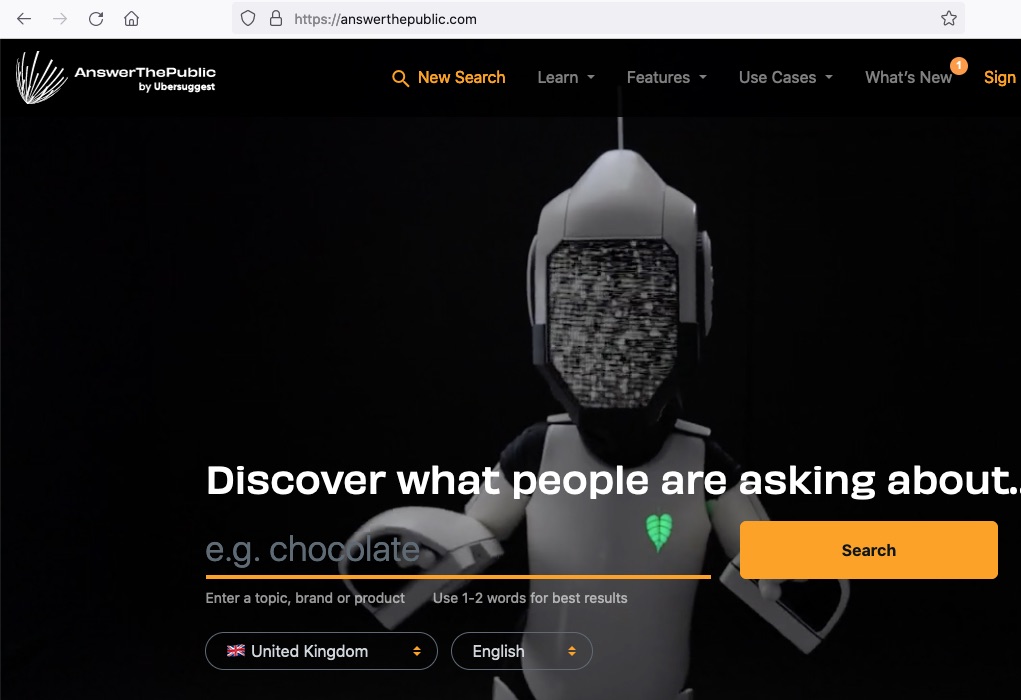
Another option is to type a keyword into Google and look at the ‘People Ask’ box of suggestions.
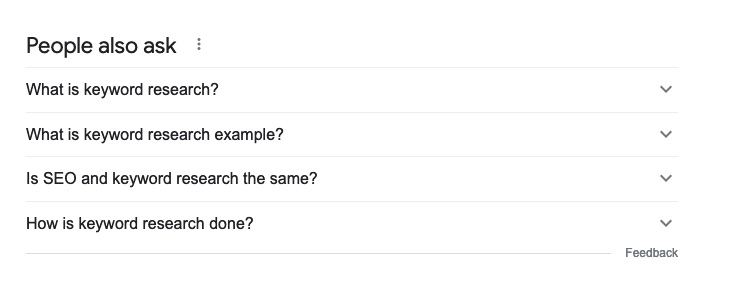
For example if you search the word ‘coaching’ on Google you can analyse the intent of the majority of people searching for this – in this case it’s to know more about what coaching is:
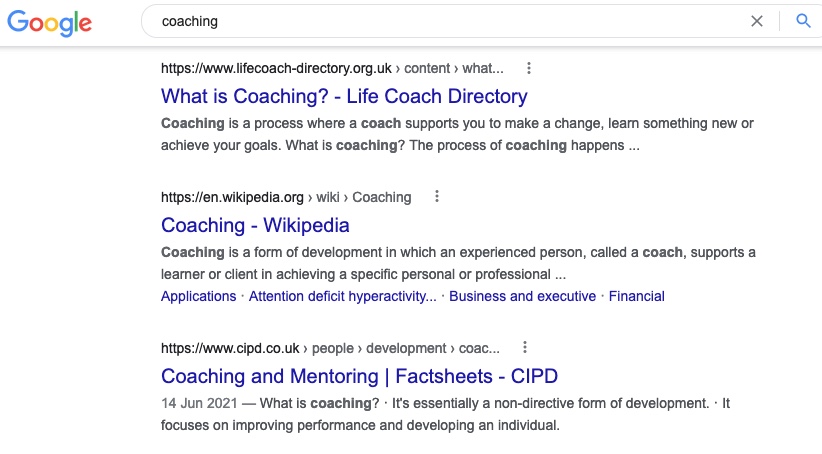
You can also scroll to the bottom and look at related searches.
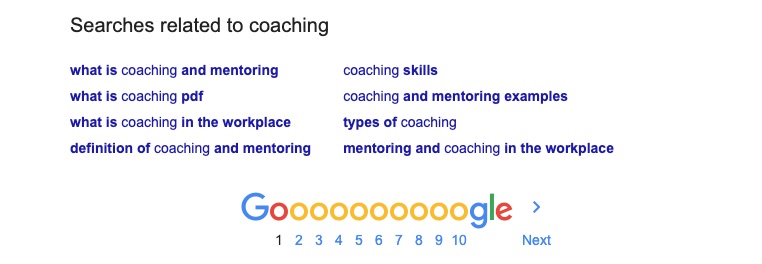
Google Autocomplete is a great tool for discovering valuable keywords.
Enter some keyword phrases into Google, and see what autocomplete suggests. These suggestions are based on what users search, so you can easily find out other keywords related to your product or service.
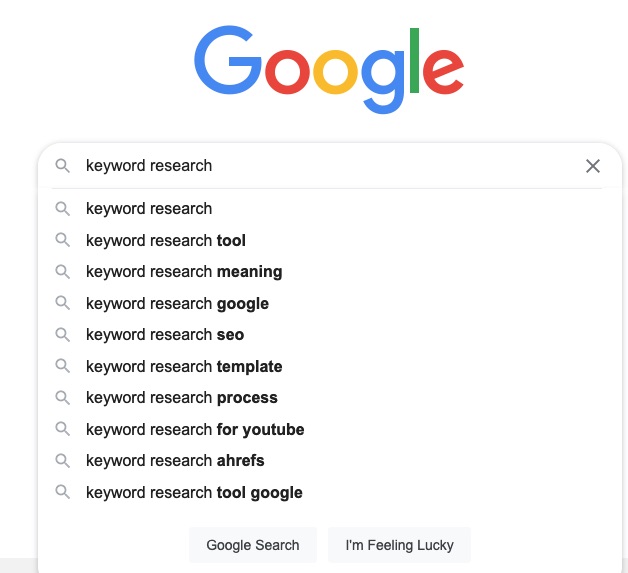
The following search engines also have auto-complete when you start typing in keywords, as well as similar suggested searches if you scroll to the bottom.
You can use ‘Google Trends‘, another free tool, to analyse demand for the keywords you are targeting.
Use synonyms
Google’s technology is smart enough to recognize synonyms and other ways of saying certain words or phrases. Use variations of the keywords you’re targeting rather than repeating the main keywords on a page. You typically should only use your targeted keyword 2-3 times on a page.
Use Keywords in the Right Places
Your keywords and phrases should be placed in meta titles, descriptions, headings and image tags on your page. Also use them in the written content towards the top of the page.
Don’t just optimize the home page. Optimise each page of your site. Target different keywords for each page.
Analyse your competitors best keywords
Who are your competitors and what are they doing to rank for the keywords you’re targeting?
To find competitors search for your own website using keywords and look at the top organic (non-paid) results.
You can look at competitors’ keywords and keyword density (how often they use them) using this keyword tool.

Conclusion
Keyword research can be powerful for understanding your target market, and how they are searching for your content, products and services.
Keyword research can uncover search terms to target, their popularity, their ranking difficulty, and more.
I hope you found this article useful. Walker Websites is based in Highams Park, East London. Why not get in touch to see how we can help with your SEO needs? Call now – 0777 169 1194.







